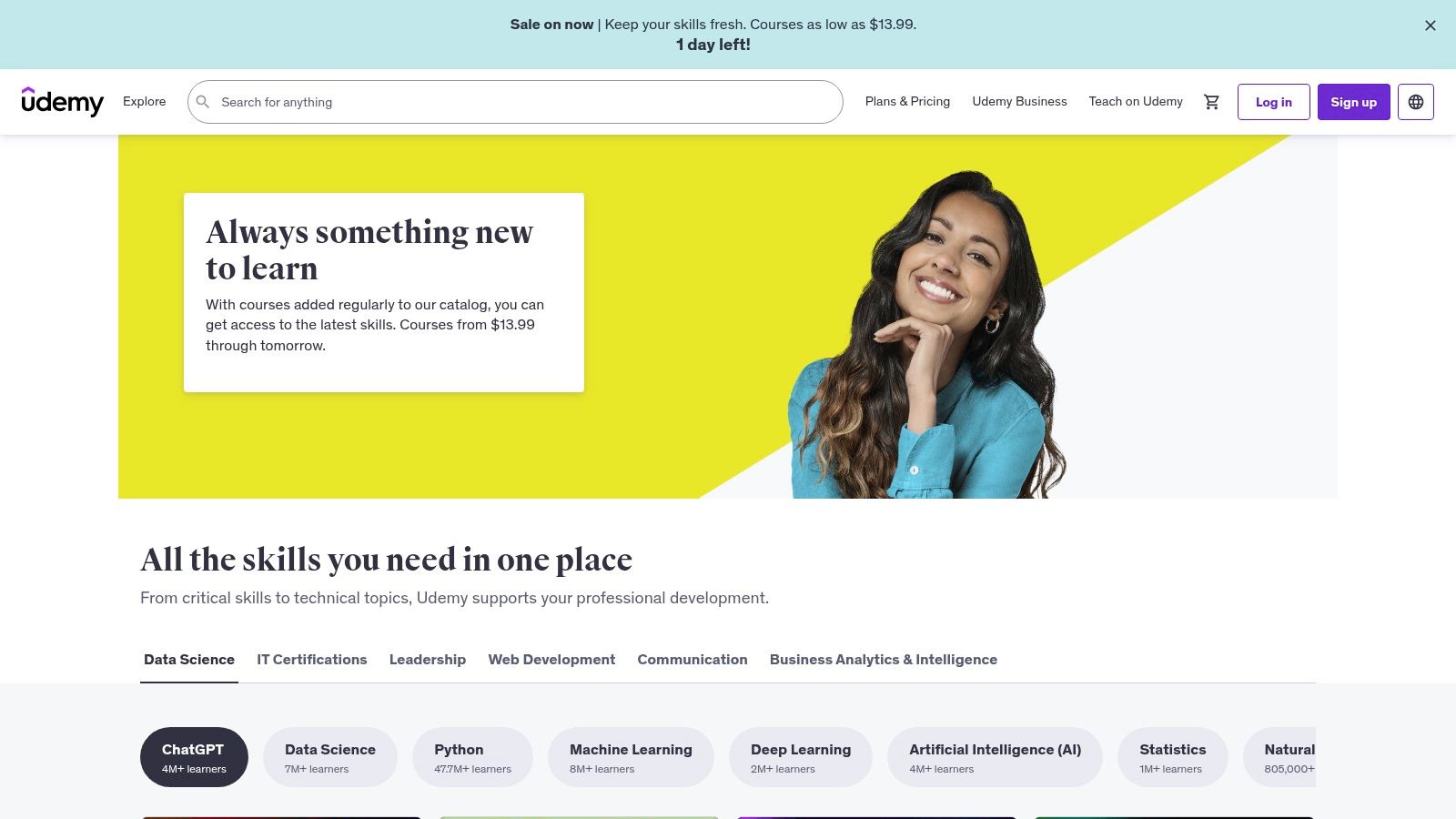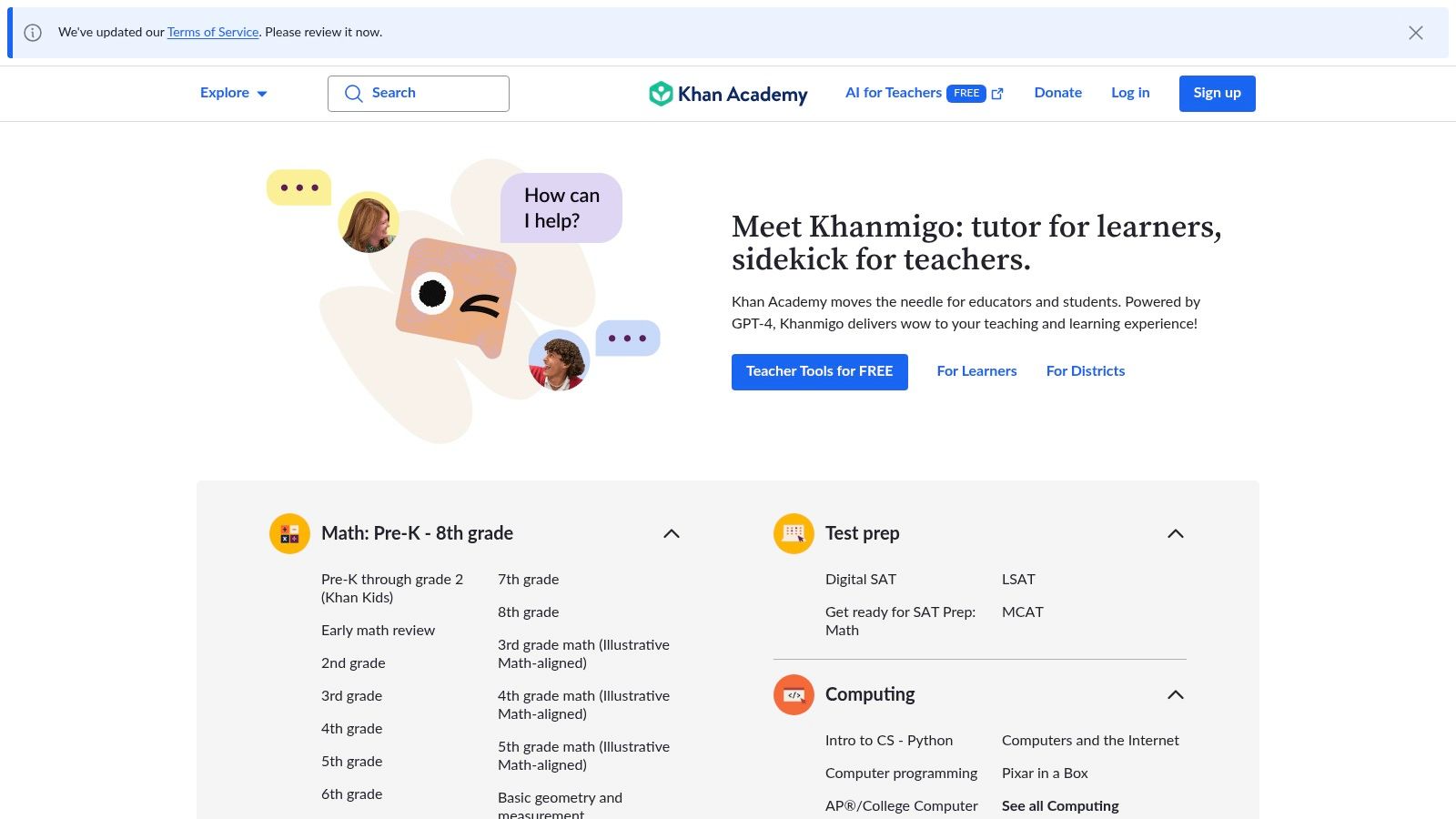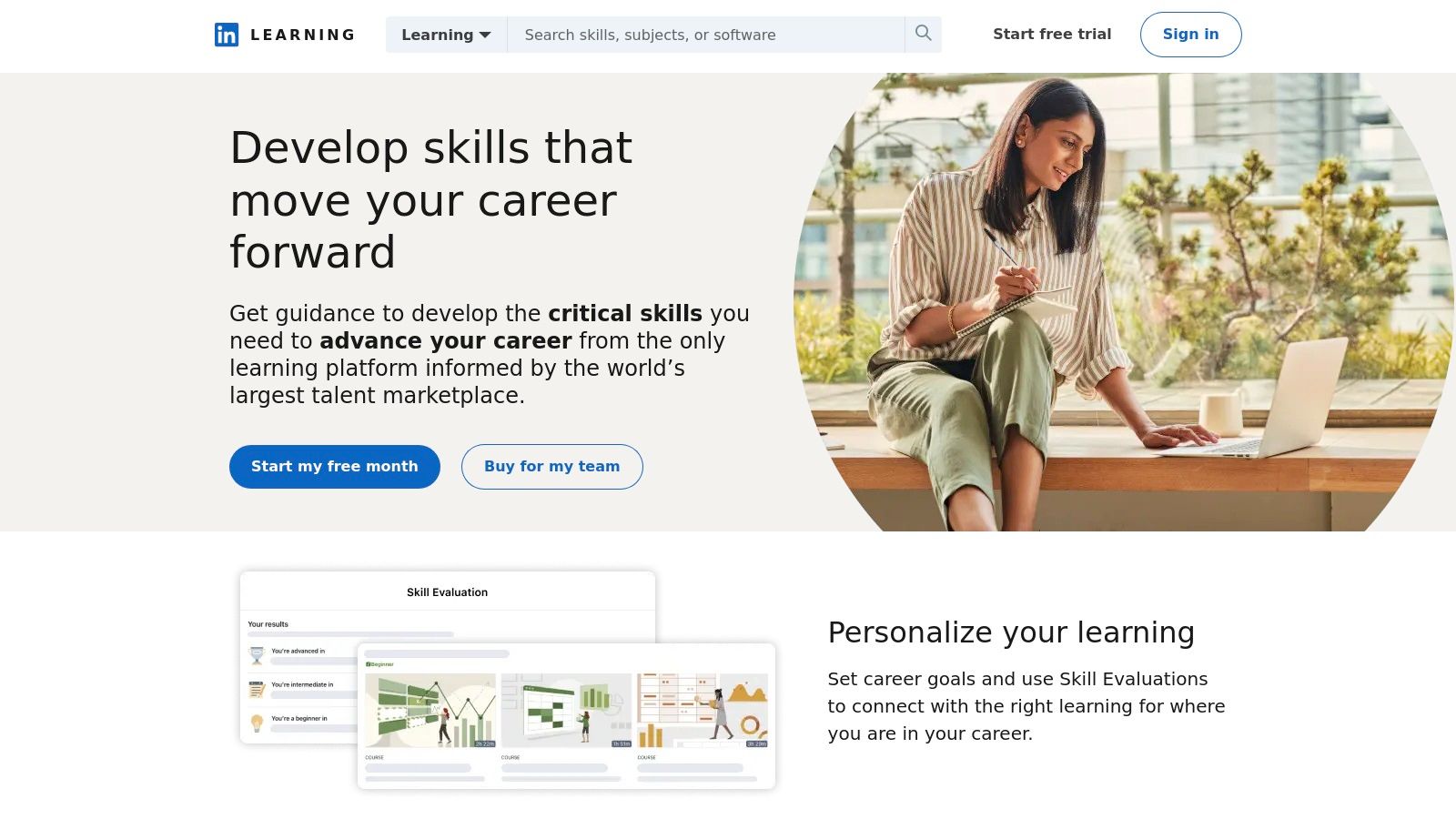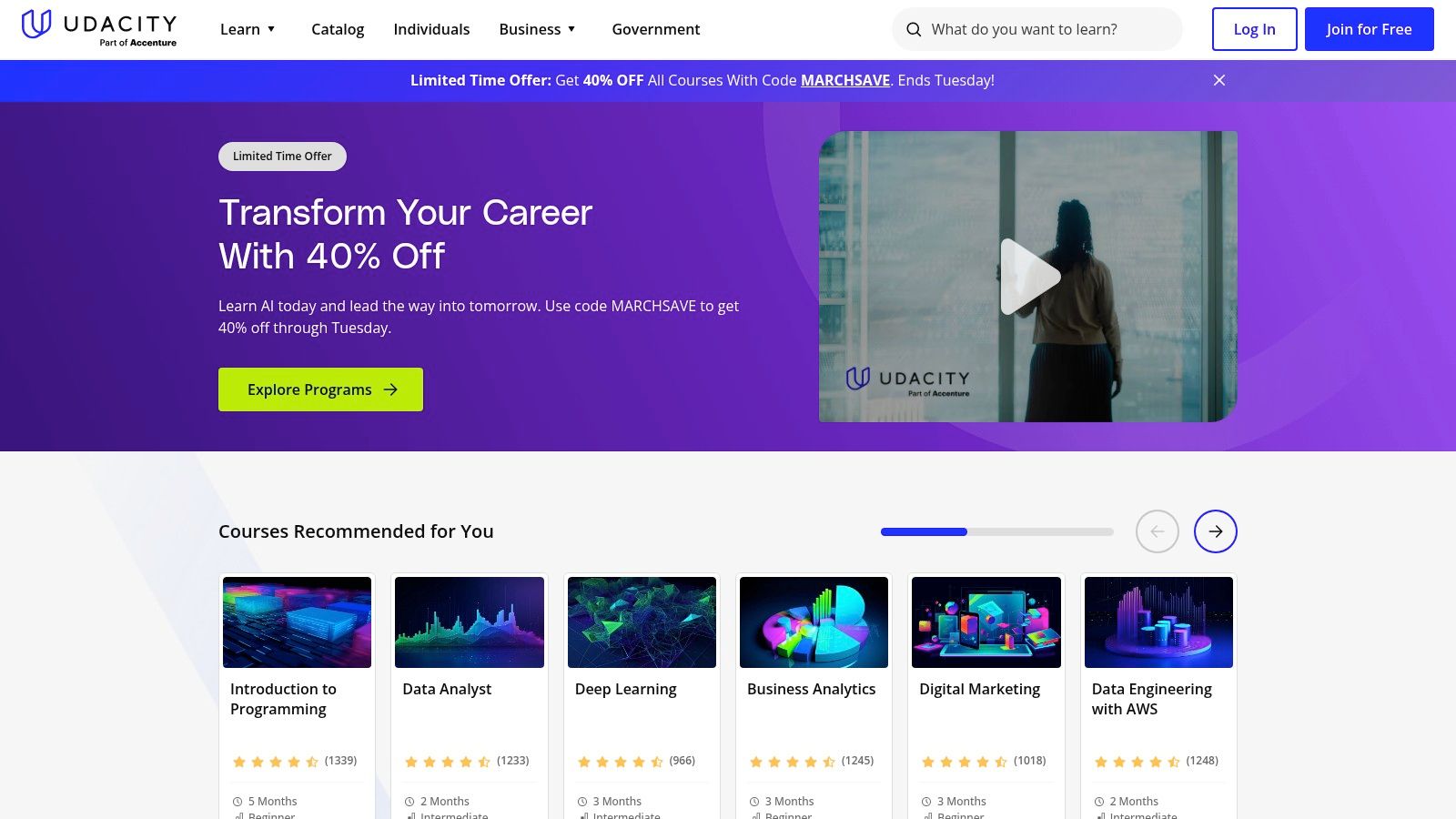Level Up Your Learning: Exploring the Best Online Education Platforms
Finding the right resources to expand your knowledge base is essential for growth, whether you run a Shopify store or an arts and crafts business. Online education platforms have become invaluable tools for acquiring new skills and staying competitive. With so many choices available, selecting the perfect platform can be a daunting task.
This curated list of the top 10 online education platforms for 2025 aims to simplify that process. These platforms provide access to high-quality education, offering flexible learning options to accommodate busy schedules and eliminate geographical limitations. They offer expert-led courses, interactive exercises, and valuable resources tailored to help you achieve your specific goals.
Key Factors in Choosing a Platform
Several key factors should be considered when choosing an online education platform:
- Breadth and Depth of Course Offerings: Does the platform offer courses relevant to your needs and at the right level?
- User Interface and Learning Experience: Is the platform easy to navigate and engaging? A positive user experience is crucial for effective learning.
- Instructor Credibility: Are the instructors experts in their fields? Look for platforms with reputable and experienced instructors.
- Certifications: Does the platform offer certifications that can enhance your resume or business credentials?
- Pricing and Payment Options: Consider your budget and explore platforms with various pricing models, including free courses, subscriptions, or pay-per-course options.
- Technical Considerations: Check for mobile accessibility and any software requirements to ensure compatibility with your devices.
An effective platform delivers engaging content, structured learning paths, and a supportive learning community. Some platforms offer free courses or trials, allowing you to explore their offerings before committing to a paid plan. Others operate on a subscription or pay-per-course model.
Exploring the Top 10 Platforms
This article delves into the strengths and weaknesses of each of the top 10 platforms. We will highlight their specific areas of focus, pricing structures, and unique features. By understanding the nuances of each platform, you can make an informed decision and choose the best fit for your learning style and business objectives.
Ultimately, the goal is to empower you to select the perfect online education platform. This will allow you to enhance your skills, grow your business, and reach your full potential.
1. Coursera

Coursera is a leading platform for online education, offering a wide variety of learning opportunities. From individual courses to complete degree programs, Coursera provides resources for individuals and businesses alike. Its collaborations with top universities and organizations like Google and IBM make it a particularly valuable resource for Shopify store owners and arts and crafts businesses.
This diverse platform offers learning experiences beneficial to a wide range of business owners. Let's take a look at what it can offer your online store.
How Coursera Can Benefit Your Business
Shopify store owners can enhance their e-commerce expertise through courses focused on several key areas.
- Digital Marketing: This includes SEO, social media marketing, and targeted campaign development.
- Data Analytics: Understanding customer behavior is vital for online success.
- Web Development: Coding courses can empower you to take greater control of your online store's functionality.
- Supply Chain Management and Logistics: Improve your store's operational efficiency.
Arts and crafts business owners can also find value in Coursera's diverse offerings.
- Creative Skills Development: Courses on photography, graphic design, and branding can help refine your artistic vision.
- Business Acumen: Courses focusing on online business strategies and financial management provide crucial business knowledge.
- Legal Protection: Learn about intellectual property law to safeguard your unique creations.
Key Features and Benefits
Coursera boasts a robust set of features designed to facilitate effective learning.
- Diverse Course Catalog: Explore a wide range of subjects, from data science and business to art and design.
- Flexible Learning: Self-paced courses allow you to learn on your own schedule.
- Credible Credentials: Earn certificates and degrees from recognized institutions, boosting your professional credibility.
- Guided Projects: Develop practical skills through hands-on projects.
- Professional Certificates: Gain industry-recognized certifications to enhance your resume.
- Coursera Plus: This subscription service provides unlimited access to a vast library of courses, specializations, and professional certificates.
Pricing and Technical Requirements
Coursera offers both free and paid courses. Individual courses typically cost between $39 and $99. Prices for Specializations and Professional Certificates vary by program. Degree programs are more expensive, aligning with traditional university tuition costs. Financial aid is available for eligible learners.
All you need is a stable internet connection and a computer or mobile device. The Coursera mobile app makes learning on the go easy and convenient.
Pros and Cons
Here's a quick overview of the advantages and disadvantages of using Coursera:
Pros:
- High-quality content from respected universities and companies
- Flexible, self-paced learning
- Financial aid options
- Mobile app for convenient learning
Cons:
- Cost of premium certificates and degrees
- Some courses have deadlines
- Limited direct interaction with instructors
- Inconsistent feedback on peer-reviewed assignments
Implementation/Setup Tips
Here are some tips for getting the most out of Coursera:
- Start Free: Explore subjects and learning styles with a free course.
- Try Coursera Plus: Utilize the free trial to access a wider range of courses and evaluate the subscription's value.
- Set Goals: Schedule dedicated learning time to stay on track.
- Engage in the Community: Connect with other learners in the forums for support and shared insights.
Website: Coursera
2. edX

edX, founded by Harvard and MIT, is a leading online learning platform known for its university-level courses. Now under 2U, edX continues its dedication to quality education while expanding into professional certifications and degree programs. This makes it a great resource for Shopify and arts and crafts business owners looking to grow their skills.
What makes edX stand out? For entrepreneurs, especially in e-commerce, continuous learning is key. edX provides access to a wealth of knowledge and skill development. This is especially important for various aspects of running a successful online business.
From data analytics and marketing to project management and computer science, edX offers valuable tools for navigating the competitive market. While strong in STEM fields, the platform also provides business courses applicable to any entrepreneur.
Features and Benefits
-
MicroMasters and Professional Certificate Programs: These targeted programs allow busy entrepreneurs to build in-demand skills and enhance their credentials.
-
Verified Certificates and Academic Credit Options: Learners can showcase their expertise with a verified certificate. Some courses even offer academic credit.
-
XSeries Programs: Deepen your knowledge in a specific area with a curated series of courses. This provides comprehensive expertise in your chosen field.
-
Full Online Master's Degree Programs: Advance your education with an accredited online Master’s degree from a reputable institution.
-
Audit Option: Explore various subjects and gain valuable knowledge by accessing most course materials for free.
Practical Applications for Shopify and Arts & Crafts Business Owners
-
Data Analysis & Business Intelligence: Learn to understand customer behavior, optimize marketing, and use data to improve sales and profits.
-
Digital Marketing & Social Media: Develop strategies to reach your target audience, raise brand awareness, and drive traffic to your online store.
-
Project Management & Operations: Improve efficiency, streamline processes, and boost productivity by mastering project management skills.
-
Financial Management & Accounting: Gain essential financial skills to manage your business finances, track expenses, and make informed decisions.
-
Computer Science & Programming: Those with a technical interest can explore website development, automation, and data analysis.
Pricing
Auditing courses is free. Verified certificates typically cost $50-$300 per course, depending on the institution and the specific program. MicroMasters and degree programs have separate pricing structures.
Technical Requirements
You'll need a reliable internet connection and a computer or mobile device. Some courses may have specific software requirements, outlined in the course description.
Pros
- High academic standards and university-level content
- Free access to most course materials
- Structured learning paths for career growth
- Strong focus on STEM and computer science
Cons
- Certificates require payment
- User interface may be less intuitive than platforms like Coursera or Skillshare
- Limited interactive elements in some courses
- Fewer courses in creative arts
Implementation/Setup Tips
- Browse the course catalog and find topics relevant to your business.
- Use the free audit option to explore courses before paying for a certificate.
- Consider a MicroMasters or Professional Certificate for structured learning.
Website: https://www.edx.org/
3. Udemy

Udemy stands out for its expansive and affordable course selection. This makes it a great resource for both Shopify store owners and arts and crafts entrepreneurs seeking to develop new skills. Whether your goal is to sharpen your marketing skills, learn new crafting techniques, or improve your financial management, Udemy likely has a course to fit your needs. Its direct-to-consumer model allows instructors to publish courses on a diverse array of subjects, providing learners with a vast selection.
Udemy boasts over 185,000 courses taught by 49,000 instructors in more than 65 languages. This extensive library spans technical skills like web development and coding, as well as creative pursuits such as photography, painting, and business management. The platform mainly uses instructor-led video lectures, supplemented with resources like downloadable worksheets, articles, and practice exercises.
For Shopify store owners, Udemy can be an excellent resource for learning about e-commerce marketing, SEO optimization, social media advertising, and dropshipping. Arts and crafts business owners can discover courses on specific crafting techniques, selling handmade products online, and building a successful creative enterprise.
Features
- Vast course library encompassing technical and non-technical subjects
- Lifetime access to purchased courses, including any future updates
- Instructor-led courses featuring video lectures and supplementary resources
- Regular discounts and promotions, making courses highly affordable
- Udemy for Business offering tailored corporate training solutions
Pros
- Affordable Pricing: Courses are frequently discounted, often ranging between $9.99 and $19.99, making them budget-friendly.
- Practical, Skill-Focused Content: Many courses are led by industry professionals, offering valuable real-world insights and practical skills.
- No Subscription Required: The pay-per-course model lets you select only the courses you want without a recurring subscription fee.
- Immediate Access: Start learning immediately after purchase, without having to wait for scheduled sessions.
Cons
- Variable Course Quality: The open instructor model means course quality can sometimes be inconsistent. It’s recommended to research and read reviews before enrolling.
- No Formal Accreditation: Udemy courses generally don't provide university credits or formal certifications.
- Limited Instructor Interaction: While some courses feature active communities and good instructor interaction, others may offer limited support.
- Content May Become Outdated: Some instructors may not regularly update their courses, which could lead to outdated content.
If you're interested in creating and selling your own online courses, you might find this helpful: Our guide on Creating Engaging Online Courses.
Website: https://www.udemy.com/
No specific technical requirements are needed to access Udemy. A stable internet connection and a device capable of playing videos will suffice. You can access Udemy on your desktop, laptop, tablet, or smartphone.
4. Khan Academy

Khan Academy is a valuable free resource in the world of online learning. Its entirely free, high-quality educational content makes it a great tool for anyone wanting to refresh basic concepts or explore something new. While not a platform for advanced professional training, its K-12 focus offers practical uses for Shopify store owners and arts and crafts businesses.
For example, if you own a Shopify store and struggle with data analysis or financial projections, Khan Academy's math courses can provide a stronger base. Need to brush up on economics to price your products more effectively? Khan Academy's economics resources offer valuable insights.
Arts and crafts business owners can also benefit. Khan Academy's art history courses provide a deeper understanding of artistic techniques and historical background. Imagine designing a new product line inspired by a specific historical period. Exploring related art history on Khan Academy can spark creativity.
Personalized Learning and Mastery
Khan Academy's personalized learning dashboard helps you track progress and find areas needing more attention. The mastery-based learning approach, using practice exercises and instructional videos, ensures solid understanding. The content aligns with school curricula and standardized tests, making it a helpful supplement for those in formal education.
- Completely free access to all materials
- Personalized learning dashboard to track progress
- Mastery-based learning with practice exercises
- Content aligned with school curriculum and standardized tests
- Parent and teacher dashboards (helpful if you're assisting children with learning)
Pros and Cons of Khan Academy
Pros:
- Completely free with no premium content restrictions
- Excellent for supplementing K-12 education
- Strong focus on conceptual understanding and mastery
- Available in 40+ languages
Cons:
- Limited advanced or university-level content
- No certificates or formal credentials
- Less extensive content in humanities and creative fields
- Not designed for direct professional development
Pricing and Technical Requirements
Pricing: Free
Technical Requirements: Any device with internet access (computer, tablet, or smartphone).
You might also be interested in exploring additional online learning resources: Key Tools for Online Educators.
Conclusion: Accessible Learning for All
Khan Academy stands out due to its commitment to accessible, quality education. Other platforms might offer specialized or advanced material, but Khan Academy's complete K-12 curriculum and free access makes it a powerful tool for reinforcing core knowledge. It empowers learners of all ages to take charge of their education. Explore its resources on the Khan Academy website.
5. LinkedIn Learning (Formerly Lynda.com)

LinkedIn Learning is a subscription-based online learning platform that stands out for its career-focused courses. With over 16,000 video courses taught by industry experts, it's a valuable resource for professionals—and aspiring professionals—looking to upskill or change careers entirely. The curriculum emphasizes software, creative, and business skills. This makes it especially relevant for Shopify store owners and arts and crafts business owners aiming to improve their digital marketing, e-commerce management, or creative design skills.
For Shopify store owners, courses on topics like SEO, social media marketing, Google Ads, and e-commerce analytics can provide crucial knowledge to boost sales and brand visibility. Arts and crafts business owners can find courses covering photography, graphic design, illustration, and even business management specifically designed for creative entrepreneurs. Imagine learning how to perfectly capture your handmade jewelry in photos or mastering the creation of engaging social media campaigns – all within one platform.
Integration With LinkedIn
One of LinkedIn Learning's greatest strengths is its direct integration with LinkedIn. You can add completed courses and newly acquired skills directly to your LinkedIn profile. This enhances your professional credibility and visibility to potential clients, collaborators, or even employers. This feature distinguishes LinkedIn Learning from other platforms and adds to its value for career growth.
Key Features and Benefits
- LinkedIn Profile Integration: Display your learning directly on your professional profile.
- Personalized Course Recommendations: Discover courses tailored to your specific role and skills.
- Downloadable Exercise Files: Get hands-on practice with practical exercises.
- Course Completion Certificates: Obtain verifiable proof of your accomplishments.
- Mobile App with Offline Viewing: Learn anytime, anywhere, even without internet access.
Pros and Cons
Here's a quick breakdown of the advantages and disadvantages:
Pros:
- High-quality, professionally produced video content
- Practical, applicable workplace skills training
- Often included with corporate or educational subscriptions
- Regularly updated courses
Cons:
- The subscription model ($29.99/month or $239.88/year) can be an investment.
- Less academic content than university-partnered platforms like Coursera or edX.
- Limited community features and interaction.
- No accredited degrees or certifications.
For those interested in applying their new knowledge, this article on How to Market Online Courses Successfully provides helpful tips.
LinkedIn Learning earns its spot on this list due to its professional development focus, high-quality content, and seamless LinkedIn integration. While the subscription cost is a consideration, the potential return on investment for career advancement can be significant. If you're ready to enhance your skillset and showcase your expertise, visit the LinkedIn Learning website to explore what it offers.
6. Udacity

Udacity stands out for its specialized, career-oriented tech training. While not directly applicable to every Shopify or arts and crafts business owner, it provides valuable skills for those aiming to boost their online presence and operations through technology.
Udacity focuses on advanced tech education, offering Nanodegree programs designed to provide in-demand skills. These programs, developed with industry leaders like Google, AWS, and IBM, cover areas such as artificial intelligence, data science, programming, cloud computing, and autonomous systems.
How Udacity Can Benefit Your Business
For Shopify store owners, understanding data analytics can be crucial. Udacity's data science or programming Nanodegrees can equip you to analyze customer behavior, optimize marketing, and personalize the shopping experience. This can lead to higher sales and increased customer satisfaction. Automating tasks is another potential benefit, improving efficiency and freeing up valuable time.
Technical skills are increasingly beneficial even for arts and crafts businesses. Coding can help automate repetitive tasks, build a better online store, or even create interactive online tutorials. A deeper understanding of digital marketing through data analysis can also expand your reach.
Features
-
Nanodegree Programs: Intensive, career-focused training designed by industry experts.
-
Real-world Projects: Gain practical experience with projects reviewed by human experts. This portfolio building is essential for showcasing your skills.
-
Technical Mentor Support & Career Services: Receive personalized guidance and support from mentors and career advisors.
-
Industry-Partnered Content: Content is created in collaboration with leading tech companies, ensuring relevance and current information.
-
Self-Paced Learning: Flexible scheduling lets you learn at your own pace and fit education around your commitments.
Pros
-
Up-to-Date Content: Access the latest technologies and trends.
-
Portfolio Development: Build a strong portfolio with practical projects.
-
Individual Mentorship: Benefit from personal support and code reviews.
-
Industry Applicability: Learn skills relevant to today's tech job market.
Cons
-
High Cost: Most Nanodegrees are around $399/month, a significant investment.
-
Tech Focus: Limited offerings outside of technology.
-
Prerequisites: Some programs require existing technical knowledge.
-
Limited Community: Less structured community interaction compared to some platforms.
Implementation/Setup Tips
-
Identify Needs: Determine which skills will most benefit your business.
-
Explore Free Courses: Udacity offers free courses to help assess your interest and compatibility.
-
Create a Schedule: Dedicate consistent time to your studies, even with self-paced learning.
Comparison
Unlike platforms like Coursera or edX which offer broader subjects, Udacity shines in specialized tech training with a career focus. Platforms like Skillshare cater more to creative fields, while Udacity addresses the need for advanced technical skills.
Website
Udacity is a valuable resource for gaining high-impact technical skills. While the cost is considerable, the potential return in business performance and career opportunities makes it a worthwhile option for dedicated Shopify and arts and crafts business owners.
7. Skillshare

Skillshare is a fantastic resource for Shopify store owners and artists crafting their businesses online. It offers a wealth of creative courses, establishing itself as a major player in online learning. Its project-based learning and strong community focus make it perfect for developing practical skills.
Skillshare zeroes in on creative fields like graphic design, photography, illustration, animation, and marketing. These skills directly translate to a better online store and stronger product presentation. Need eye-catching product photos for your Shopify store? A captivating logo for your craft business? Skillshare provides the tools and training to make it happen.
Features and Benefits
-
Project-Based Learning: Skillshare’s greatest strength lies in its hands-on, project-based approach. You won't just watch lectures; you'll actively create projects, mirroring real-world scenarios. This is especially helpful for shop owners who can instantly apply what they’ve learned, designing new product mockups or crafting better marketing materials.
-
Community Interaction: The platform cultivates a lively community where you can share your work, receive feedback, and learn from fellow creators. This peer-to-peer learning provides invaluable perspectives and keeps you motivated.
-
Short, Focused Classes: Skillshare classes are typically 20-60 minutes long, easily fitting into a busy schedule. This bite-sized learning is perfect for entrepreneurs juggling multiple responsibilities.
-
Offline Viewing: Download classes through the Skillshare mobile app (iOS and Android) and learn on the go, even without internet. A great feature for busy entrepreneurs who travel or have limited downtime.
Pricing and Technical Requirements
Skillshare uses a subscription model, offering unlimited class access for about $165/year or $32/month. It’s accessible via web browser and mobile app.
Comparison With Similar Tools
Platforms like Coursera and Udemy offer some creative courses, but Skillshare’s community interaction and project-based learning set it apart. It's specifically designed for creative professionals and hobbyists, making it a better fit for building practical skills over purely theoretical knowledge.
Implementation/Setup Tips
-
Identify Skill Gaps: Evaluate your skills and pinpoint areas for improvement that will directly benefit your business. This could be product photography, social media marketing, or logo design.
-
Browse the Catalog: Skillshare has thousands of classes. Use the search and filters to find classes that align with your specific needs and goals.
-
Start with a Beginner-Friendly Project: Don't feel obligated to start with advanced classes. A beginner project builds confidence and provides a solid foundation.
-
Engage With the Community: Actively participate in discussions and share your work. The feedback and support are invaluable.
Pros
- Affordable subscription for unlimited access
- Focus on creative and design-oriented subjects
- Classes taught by working professionals and creators
- Emphasis on practical projects
Cons
- Variable class quality due to the open teacher model
- Limited advanced or technical content in certain areas
- No formal certifications or accreditation
- Less structured learning paths compared to curriculum-based platforms
Website: Skillshare
Skillshare’s unique blend of affordable learning, community engagement, and project-based training makes it a standout choice for creative development. For Shopify store owners and arts and crafts business owners, it's a powerful tool for gaining practical skills that can directly boost online success.
8. Pluralsight
Pluralsight is a leading platform for boosting your tech skills, especially helpful for Shopify store owners and even arts and crafts businesses looking to improve their online presence. While it focuses on software development, IT, and data science, the skills you learn can benefit any business owner.
Why Pluralsight Belongs on This List:
Understanding the technical side of e-commerce can be a huge advantage for Shopify store owners. Pluralsight offers courses on everything from website development and database management to cybersecurity and cloud computing. This empowers you to optimize your store, fix problems, and maybe even build custom features. Even for arts and crafts businesses, learning about digital marketing, SEO, and data analytics can significantly increase online sales and reach. Pluralsight's comprehensive approach makes it valuable for anyone looking to gain a competitive edge.
Features and Benefits:
-
Skill IQ and Role IQ: These assessments help you evaluate your current skills and identify areas for improvement, creating a personalized learning plan. For example, a Shopify store owner could assess their SEO/SEM or data analytics skills to find weaknesses and focus their learning.
-
Hands-on Labs: You can gain practical experience through interactive coding environments. While less directly applicable to arts and crafts businesses, understanding basic coding can help Shopify store owners customize their online stores.
-
Learning Paths: Structured learning paths guide you through a specific technology or career path. Paths focusing on front-end web development or digital marketing are especially relevant for e-commerce entrepreneurs.
-
Expert-Led Courses: Learn from industry experts who share their real-world experience.
Practical Applications and Use Cases:
Shopify Store Owners
- Improve Store Performance: Learn about website optimization, SEO, and data analytics.
- Customize Your Store: Develop skills in Javascript and Liquid to change your store's theme and functionality.
- Protect Customer Data: Understand cybersecurity principles.
Arts and Crafts Business Owners
- Boost Online Marketing: Learn about SEO, social media marketing, and content creation.
- Understand Customer Behavior: Gain insights into data analytics to optimize sales strategies.
Pros:
- In-depth coverage of technical topics
- High-quality content from recognized experts
- Regularly updated content
Cons:
- Cost: Subscription cost ($29/month or $299/year for individual plans) – consider the return on investment.
- Technical Focus: Some courses may not be directly applicable to all business owners.
- Overwhelming for Beginners: Start with foundational courses.
- Limited Community Features: Fewer social and community aspects than some other platforms.
Pricing and Technical Requirements:
Pluralsight offers individual and business plans. Individual subscriptions begin at $29/month or $299/year. Access is usually through a web browser, with specific software requirements for some hands-on labs.
Comparison with Similar Tools:
Platforms like Udemy and Coursera offer a wider range of subjects. However, Pluralsight’s strength is its in-depth technical content and structured learning paths, making it ideal for developing specific tech skills.
Implementation/Setup Tips:
- Take a Skill IQ assessment to determine your skill level and learning needs.
- Explore relevant learning paths.
- Schedule dedicated time for learning and maintain a consistent schedule.
Website: https://www.pluralsight.com/
9. FutureLearn

FutureLearn offers a unique approach to online learning, particularly beneficial for Shopify store owners and arts and crafts business owners. If you're looking to expand your skillset with a global perspective, this platform is worth exploring. Founded by The Open University, FutureLearn provides access to courses from leading universities and cultural institutions worldwide. It emphasizes social learning and collaboration, setting it apart from other online learning platforms.
Why FutureLearn Deserves a Spot on this List:
FutureLearn distinguishes itself with its focus on humanities, social sciences, business, and creative arts. These areas are highly relevant for entrepreneurs seeking to improve their marketing, branding, customer communication, and business management skills. Its European and international perspective offers fresh insights. These are not always found on platforms with a US-centric focus. The emphasis on social learning fosters valuable networking opportunities, connecting you with peers and experts globally.
Features and Benefits:
- Flexible Learning Options: Choose from short courses, in-depth programs, and even online degrees. These options cater to various needs and time commitments. Short courses are especially ideal for busy entrepreneurs. They allow for quick acquisition of specific skills.
- Social Learning Experience: Engage in discussions with fellow learners and instructors directly within the course. This creates a sense of community and facilitates valuable peer-to-peer learning. This feature can be a great way for Shopify and arts/crafts business owners to find inspiration, share best practices, and build connections.
- Microcredentials: Earn formal recognition for your new skills with microcredentials. This can boost your professional profile and attract new customers.
- Diverse Subject Matter: FutureLearn offers a wide array of subjects. These range from marketing and business strategy to design thinking and creative writing. All can enhance your business and creative endeavors.
- Article-based Learning: Many courses incorporate articles alongside videos. This varied approach creates a more engaging learning experience, especially for those who prefer reading and reflecting.
Practical Applications for Shopify & Arts/Crafts Businesses:
- Marketing & Branding: Enhance your brand strategy, social media marketing, and content creation skills.
- Customer Communication: Improve your customer service and learn effective communication strategies. This can help build stronger customer relationships.
- Business Management: Develop essential business skills, including financial planning, inventory management, and strategic planning.
- Creative Skill Development: Explore courses in design, photography, and other creative fields. This allows you to enhance your product offerings and marketing materials.
Pricing:
Many courses offer free access for a limited time (typically 4-6 weeks). However, full access, including graded assignments and certificates of completion, usually requires a paid upgrade. Prices vary by course and program.
Technical Requirements:
FutureLearn is accessible through a web browser and mobile app. A stable internet connection is required.
Comparison with Similar Tools:
Compared to platforms like Coursera or edX, FutureLearn has a smaller course catalog. It also has fewer technical offerings. However, its strong humanities and social science focus, European perspective, and emphasis on social learning set it apart. This makes it an excellent choice for individuals focused on business development, marketing, and creative skills.
Implementation/Setup Tips:
- Browse the course catalog and find courses aligned with your business goals.
- Utilize the free access period to explore course content before purchasing an upgrade.
- Actively participate in discussions and network with other learners. This will maximize the social learning experience.
Pros:
- Strong humanities and social science offerings
- European and international perspective
- Clean, accessible interface
- Good balance of academic and professional content
Cons:
- Limited free access
- Smaller course catalog than larger platforms
- Fewer technical and computer science offerings
- Less name recognition outside the UK and Europe
Website: https://www.futurelearn.com/
10. Codecademy

Codecademy is an online learning platform built for aspiring programmers. Its interactive, browser-based environment makes learning practical, especially for Shopify store owners and arts and crafts business owners looking to boost their tech skills—even without any prior coding experience. Whether you're looking to personalize your Shopify theme, automate daily tasks, or dive into data analysis, Codecademy offers a structured way to learn valuable coding skills.
Practical Applications for Shopify & Arts/Crafts Businesses
-
Shopify Store Owners: Learn how to customize your online store's theme, add special features, integrate APIs, and automate tasks like inventory management. Understanding HTML, CSS, and JavaScript can greatly enhance your control over your store’s appearance and functionality, possibly saving you money on developer fees.
-
Arts/Crafts Business Owners: Develop the skills needed to build a custom website, automate social media posts, manage online orders more effectively, and even explore data analysis to understand customer preferences. Python can be especially useful for automating repetitive tasks and analyzing sales data.
Features & Benefits
-
Interactive Coding Environment: Code directly in your browser; no complex software installations necessary. This hands-on approach reinforces coding concepts with instant feedback.
-
Structured Learning Paths (Career Paths & Skill Paths): Choose paths designed for specific career goals or focus on building individual skills. This helps learners move logically from basic to more complex coding concepts.
-
Project-Based Learning: Apply your new knowledge by building real-world projects, developing a portfolio to showcase your coding abilities.
-
Community Support: Active forums provide a place to connect with other learners, ask questions, and receive guidance.
Pros
-
Hands-on Coding from Day One: Start coding immediately with no setup required.
-
Structured Progression: Clear learning paths guide you through increasingly complex coding concepts.
-
Strong Community Forums: Benefit from the support of other learners and expert guidance.
Cons
-
Pro Subscription for Full Access: Many projects and certificates require a Pro subscription ($19.99/month).
-
Limited Theoretical Depth: Focuses more on practical skills than in-depth computer science theory.
-
Linear Progression: The structured learning paths can feel limiting for some learners who prefer a more exploratory approach.
Pricing
- Free tier with access to basic courses and exercises.
- Pro subscription ($19.99/month) for access to additional content, projects, and certificates.
Technical Requirements
- A computer with internet access and a web browser. No additional software needed.
Comparison with Similar Tools
Platforms like Coursera and edX offer a wider range of subjects, including computer science theory. However, Codecademy focuses on a hands-on coding approach, making it a great starting point for beginners.
Implementation/Setup Tips
-
Explore the platform and find relevant learning paths with the free tier.
-
Consider the Pro subscription if you need certificates or want to access specific projects.
-
Participate in the community forums for help and networking.
Website: Codecademy
Codecademy stands out for its accessible and interactive coding lessons. Its emphasis on practical application and structured learning makes it a valuable resource for Shopify and arts/crafts business owners looking to improve their technical skills and grow their businesses.
Core Features Comparison: Top 10 Online Education Platforms
| Platform | Core Features ★ | Pricing & Value 💰 | Target Audience 👥 | Unique Selling Points ✨ |
|---|---|---|---|---|
| Coursera | University partnerships, guided projects, degrees | Free courses & Coursera Plus subscription; pricier certifications | Lifelong learners, professionals | Prestigious institution affiliations |
| edX | University-level courses, MicroMasters, verified certs | Free audit option; paid certificates | Academics, career advancers | Harvard/MIT founded, quality academic content |
| Udemy | Vast course library, lifetime access, flexible buying | Affordable with frequent discounts | Hobbyists, self-starters, professionals | One-time purchase per course |
| Khan Academy | K-12 focus, mastery-based progress, personalized dashboard | Completely free | Students, educators, parents | Free world-class education |
| LinkedIn Learning | Professional video courses, LinkedIn integration | Subscription-based; often via corporate bundles | Professionals, career developers | Seamless LinkedIn profile integration |
| Udacity | Nanodegrees, project-based tech content, mentor support | Premium pricing; career-focused packages | Tech professionals, career switchers | Real-world projects with industry mentorship |
| Skillshare | Project-based, creative courses, community learning | Affordable subscription model | Creatives, freelancers | Focus on creative community and project sharing |
| Pluralsight | Technical courses, skill assessments, interactive paths | Subscription-based; enterprise-friendly pricing | IT pros, tech teams | In-depth technical assessments |
| FutureLearn | Social learning, short courses, microcredentials | Limited free access; extra content at a cost | Academics, professionals, casual learners | Collaborative, discussion-driven learning |
| Codecademy | Interactive coding exercises, structured learning paths | Free basic access; Pro subscription for extras | Beginner and intermediate coders | Browser-based interactive coding environment |
Charting Your Course: Choosing The Right Online Education Platform
Navigating the world of online education platforms can be daunting. With so many options available, finding the perfect fit for your needs requires careful consideration. Think about your learning style, budget, career goals, and desired subject matter. Do you prefer structured courses or a more self-directed approach? Consider your technical skills and comfort level with different platform interfaces as well.
Starting small is a smart strategy. Test a single course or a free trial before committing to a larger investment. This allows you to evaluate the platform's functionality, user experience, and overall suitability. Pay attention to community features, support resources, and integration options. These can greatly enhance your learning experience.
Budget is a crucial factor. Free resources like Khan Academy offer excellent value. However, premium platforms often provide more in-depth content, personalized feedback, and certifications. Weigh the benefits against the cost. Choose an option that aligns with your financial resources. Consider the resources needed to manage and maintain the platform. Some may require more technical expertise or dedicated staff time.
Integration and compatibility are essential, especially for Shopify store owners. Ensure your chosen platform integrates seamlessly with your existing tools and workflows. For example, if you sell art supplies, a platform integrating with your Shopify store could allow you to offer complementary courses or workshops. This can enhance the customer experience and drive sales.
Key Considerations For Choosing a Platform
-
Define Your Learning Goals: Identify your objectives and choose a platform that aligns with them. What skills do you want to acquire or improve?
-
Evaluate Your Budget: Explore both free and paid options, balancing cost with features and benefits. Consider the long-term value of a paid platform.
-
Prioritize Integration: Ensure seamless compatibility with your existing tools, especially your Shopify store. This can streamline your operations and enhance your customer experience.
-
Start Small and Test: Try platforms with free trials or individual courses before making significant investments. This allows you to experience the platform firsthand.
The top 10 platforms highlighted in this article – Coursera, edX, Udemy, Khan Academy, LinkedIn Learning, Udacity, Skillshare, Pluralsight, FutureLearn, and Codecademy – offer a great starting point for your exploration. They provide a mix of free and paid options, catering to a wide range of interests and skill levels.
But what if you could integrate education directly into your Shopify store? Imagine offering exclusive courses and workshops alongside your products. Tevello empowers you to do just that. Enhance your Shopify store with integrated courses and communities. This streamlines your operations and unlocks new revenue streams through upselling and cross-selling opportunities. From customizable learning paths to interactive workshops and subscription-based modules, Tevello offers a comprehensive solution to elevate your brand and cultivate a thriving customer community. Explore the power of integrated education for your Shopify store. Discover how Tevello can help you grow your business and empower your customers.




